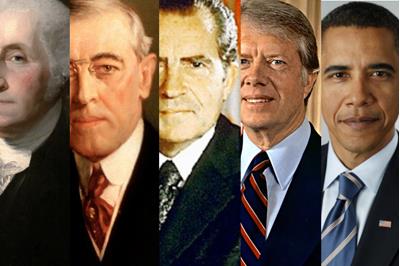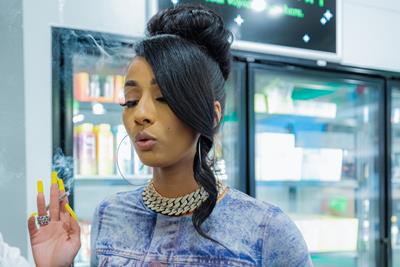
Sunday February 14, 2016
 420 Culture
420 Culture
Since Colorado and Washington legalized recreational marijuana in 2012, a rapid wave of progress has wafted over the United States. Today, marijuana is legal for medicinal purposes in 23 states and completely legal in four, allowing millions of Americans to buy and use marijuana without fear of criminal charges. However, the federal government still refuses to acknowledge its medicinal value or repeal its criminalization laws, placing the plant among the ranks of LSD, heroin, ecstasy, and other Schedule 1 drugs.
As statewide tides continue to turn, marijuana's federal status might change soon too. This President's Day, let's take a look at the five biggest presidential players in the steady march toward marijuana legalization. We're not there quite yet, but thanks to these leaders, our government's relationship with marijuana has evolved and exposed the complicated discrepancy between state and federal law.
President George Washington (1789-97)
Our nation's original founding father, President Washington, was a bona fide hemp farmer who documented his efforts to separate THC-rich female plants from their male counterparts. Washington's farm at Mount Vernon is now open to tourists, who learn that the first president's hemp was spun into sturdy rope, canvas, fishing nets, and other textiles.
President Washington's agricultural accomplishments may seem progressive in retrospect, but as hemp was phased out in favor of tobacco, wheat, and other crops, American presidents began to ignore or reject the idea that marijuana could be useful.
President Woodrow Wilson (1913-1921)
More than a century ago, President Woodrow Wilson did two things that paved the way for the potential legalization of marijuana. First, in 1914, he signed the Harrison Narcotic Act into law. This law placed trade restrictions on opium, banning all imports and exports except for medicinal use. It also required that all opium prescriptions be registered with the IRS and taxed.
A few years later, Wilson took the first step toward alcohol prohibition but disguised it as a wartime necessity. By requiring breweries and distilleries to conserve grain and limit their alcohol content, Wilson's administration laid the framework for the 18th amendment and signaled to the American people that the federal government was getting more involved in their drinking habits.
President Richard Nixon (1969-1974)
Federal drug regulation has come a long way since the Wilson administration, but this progress wasn't a straightforward journey. After years of prohibition drama and public health crises, another president got a chance to tighten the federal government's grip on recreational drug users: President Richard Nixon. He was responsible for classifying marijuana as a Schedule I drug, declaring the War on Drugs, and sup-pressing scientific recommendations that criminalization was ineffective and marijuana had medicinal value.
In a strange way, Nixon's inflammatory rhetoric and manipulative tactics actually make a modern-day case against federal prohibition. He ignored scientific data in favor of ideology, and now, the War on Drugs has been so economically devastating that politicians can no longer ignore the facts: criminalization simply doesn't work.
President Jimmy Carter (1977-1981)
Our 39th president recently announced he was cancer-free, but four decades ago, the 91-year-old one-termer was interested in medicinal treatments for a different reason. After the Nixon administration declared war on recreational drug use, President Jimmy Carter dared to declare that punishment should not do more damage than the substance itself. In addition to implying that marijuana criminalization laws were excessive and ineffective, he requested further research into its medicinal effects.
In 1977, less than a year after being sworn into office, Carter addressed Congress with a lengthy message about his plans to tackle drug abuse. In clear terms, he told the representatives that he wanted to end federal penalties for marijuana possession and let individual states adopt their own marijuana laws. He still laid out ways to discourage recreational marijuana use, but Carter ultimately recommended decriminalization on a federal level. He believed the commission that Nixon ignored, and he understood that personal marijuana use was less harmful than the effects of strict marijuana laws.
President Barack Obama (2009-2017)
In the early years of his presidency, President Obama was reluctant to take the topic of marijuana legalization seriously, let alone embrace it as an important social issue. However, it was during Obama's presidency that Washington and Colorado became the first two states to legalize recreational marijuana use. Since then, Obama's stance on weed has softened considerably, though his administration continues to enforce federal marijuana laws in states with legalized marijuana.
In 2014, Obama told The New Yorker that marijuana use was a "bad habit" no more harmful than drinking alcohol. He expressed concern about the implications of legalizing it completely, but he acknowledged the unfair fact that low-income communities and minorities faced much harsher penalties for a habit that was common among all classes and races.
A year later, Obama eliminated a legal guideline that prevented federal researchers from studying the effects of marijuana. Because it is classified as a Schedule I drug – in other words, a drug without medicinal value – there were multiple barriers in place to prevent scientific research on marijuana. Now, there's one fewer requirement in place.
The Next President (2017-?)
With a new presidential election right around the corner, medicinal and recreational marijuana users may be wondering what's next for the federal government. Will the next President take steps to challenge marijuana's status as a Schedule I drug? Will federal agencies enforce criminalization laws in states that allow marijuana – or loosen federal restrictions so that growers and retailers can bank and pay taxes?
Legalization is popular among liberal democrats and conservative libertarians alike. For example, democratic hopeful Bernie Sanders wants to end the War on Drugs and repeal federal marijuana prohibition, but he would leave legalization up to individual states. His opponent in the primaries, Hillary Clinton, plans to move marijuana to Schedule 2 and "learn" from states with legalized marijuana.
Meanwhile, Republican frontrunner Ted Cruz has changed his stance from pro-prohibition to a more neutral take on state and federal laws. In 2014, he expressed disappointment that Pres. Obama didn't enforce federal marijuana law more harshly in states that legalized it. Now, he says he would respect state autonomy. Fellow Republicans Chris Christie and Jeb Bush haven't reconsidered their federalist approaches, and Marco Rubio also supports enforcing federal marijuana law but is "open" to legalizing medicinal marijuana use.
Of course, even if a pro-pot politician is elected, there's no telling how much support the next President will have from other legislative branches. If you live in one of the many states that will have a marijuana measure on the ballot this fall, you may get a chance to participate in the next wave of progress.
Photo Credit: PotGuide.com







